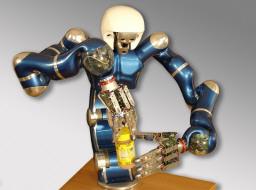Italy on Wednesday unveiled a coffee-making robot it built with European Union partners.
The robot, named Justine, is the first result of an EU project called DEXMART, led by Naples University Professor Bruno Siciliano.
Putting Justine through her paces at a robotics conference here, Siciliano said: ''She's flexible and precise enough to make a cup of coffee - although she only stretches to the instant variety at the moment.
''However, she can also pick things up off the floor''.
Over the next four years the DEXMART team will try to make Justine's hands and movements more and more like human ones.
The professor said he was confident that within 15 years robots will be able to help us at work and in the home, doing many household chores.
The project faces two key challenges: making robots that can use two hands together, like humans do, and making them 'aware' enough to stop what they're doing if a human being gets in the way.
''We want to develop a system of two-handed manipulation, equipped with sensors that make the robot conscious of its surroundings and the people in its working space,'' Siciliano said.
The 6.3-million-euro DEXMART programme involves research partners in France, Germany and Britain. DEXMART stands for 'DEXterous and autonomous dual-arm/hand robotic manipulation with sMART sensory-motor skills'.
Siciliano explained that the problem of using two hands together, the way humans do when they pick up a heavy plant pot, is a particularly sticky one.
At present robots can use a single arm with reasonable accuracy and flexibility. But until now they have fallen short of the technological complexity and artificial intelligence needed for a two-handed approach.
This is the key to making robots that can function usefully not only in factories, as they do already, but also in everyday human environments, where things are unpredictable.
But if they are to help and not hinder in the home, robots must also be aware of what is going on around them, Siciliano explained.
For this robots need a sophisticated system of sensors enabling them to respond to unforeseen events, such as the presence of a person in an area where they are about to perform an action.
Siciliano, a Neapolitan native, added that being chosen to lead the project was an important accolade for a city which often got bad press.
''Our city is always excessive, in good things and bad.
In this case we can proudly say that we are leaders in a field which borders on science fiction''.
In another Italian-led EU presentation at the conference, Pisa University Professor Paolo Dario showed off models of microscopic robot surgeons that will zoom through the bloodstream to carry out emergency surgery in places human hands find hard to get at.
He said the Aracne bots, controlled by external joysticks, would be ''like something out of Fantastic Voyage'' - a cult 1960s sci-fi flick starring Raquel Welch.













